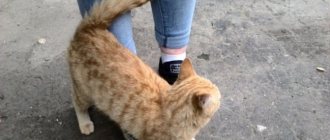If your cat is hiding or running away, it means she is not herself. She is afraid that she may be harmed or that her life is in danger. If your cat's behavior suddenly changes, there is likely a fear-based explanation.
If your cat is suddenly scared, consider whether anything has recently changed in her environment. Disruptions to the cat's daily routine can make a cat skittish, such as moving furniture and new people. Your cat may have encountered a predator near her home and no longer feels safe. Unexpected loud noises (thunder, construction and screaming) as well as illness and injury make cats feel vulnerable.
It takes a calm, relaxed owner to cope with the needs of a frightened cat. In fact, the owner's anxiety will make the cat even more nervous. You need to calm your cat, but how you approach this depends on the reason.
The cat is wildly afraid of strangers
Hello!
The cat is approximately 7 months old (neutered a week ago, vaccinated, healthy). Two months ago she was picked up on the street. Since then, he only trusts the girl with whom he lives. He hides in front of strangers, shakes, and is wildly afraid. As soon as he realizes that a stranger has come in, the cat changes before his eyes and disappears. At the same time, he is an ideal cat with his owner. Affectionate, sociable, playful. This behavior problem has remained unchanged for these two months.
Some cats cannot stand strangers in the house. One of the reasons for this behavior is the lack of communication with people at an early age: sometimes, for a cat to hide from guests for the rest of its life, it only takes one case when a guest was too noisy or treated the kitten poorly.
A particularly nervous and fearful cat can be given a sedative - special drops, but you should not give such a remedy all the time. A sedative is just a small help that helps to slightly speed up the process of getting used to strangers. In any case, with or without drops, frequent meetings with people should help the cat understand that the arrival of guests does not threaten it in any way. It is very important that the cat, without running away, learns to allow strangers at a fairly close distance.
One of the ways to accustom a cat to guests is to prevent it from running away and hiding. To do this, put a harness on it or put it in a carrier for a while. Moreover, it is desirable that the cage is located in the same room as the guests, who need to be warned so that they behave calmly, do not shout or raise their voices. At first, your family members can play the role of invitees. Of course, at first the doorbell will alarm the pet, but the cat will no longer be able to escape from the carrier and as soon as it sees its friends, it will quickly calm down. If you do this constantly, the cat will very quickly get used to the idea that the doorbell does not pose a threat. Over time, you will be able to ask "real" guests to enter the room with one of the family members and sit next to the cage. It is only important that the training is regular. In this case, the cat carrier will become a shelter.
As soon as the cat, being in its house, gets used to guests, you need to gradually accustom it to closer contact with them. Let guests sit as close to the pet's cage as possible, but do not lean over. In this case, you can offer the cat some kind of treat: food strengthens relationships much faster than affectionate conversations. Most likely, the cat will refuse the treat at first, but sooner or later everything will work out. The main thing is to be patient and attentive.
Helping your cat cope with stress
Cats have a hard time with changing their environment; it is stressful for them. What to do if you can’t avoid a trip to the country, a trip to the veterinarian or hairdresser?
Two necessary conditions for the trouble-free movement of a cat are a calm owner and a comfortable carrier, which should become a second home for the animal. You cannot carry the animal in your arms.
Before traveling, prepare a mobile shelter for your cat - a comfortable carrier with hard walls, soft bedding and ventilation. For sound insulation and warmth, the carrier is wrapped with soft cloth on top. The cat should perceive the mobile house as a shelter where your pet can hide, say, after a doctor’s examination and calm down.
Required conditions after stress - peace and quiet
Habit plays an important role. If you plan to often take your cat with you on trips, you need to gradually accustom it to this from childhood. A pet that regularly travels in its portable home will not create problems during its next voyage.
Medicinal methods
In order to prepare the cat for stress, which cannot be avoided, special medications based on herbal ingredients are used. For example, Fitex contains hops, motherwort, valerian, and Baikal skullcap. In addition to these herbs, Stop-Stress contains phenibut. The drug Kot Bayun is available in the form of infusion and tablets. It includes extracts from a dozen medicinal plants.
To overcome stressful situations, calming cat food containing herbal sedatives and special collars with pheromones are also produced.
A calming collar with pheromones will help the animal cope with a stressful situation
Table: Calming products for cats
| A drug | Active substance | Release forms | Dosage | Effect | Price |
| Stop stress | Active ingredients: phenibut (aminophenylbutyric acid) + extracts of medicinal plants (catmint, motherwort, hops, Baikal skullcap). | Drops and tablets | 1 drop per kg of animal body weight twice a day; or 0.25 tablets with a weight up to 5 kg, 0.5 - with a weight from 5 to 10 kg; for body weight more than 10 kg, give a whole tablet. | Long lasting calming effect | 145 rub. |
| Fitex | Plant origin. The composition of the drug includes the following extracts: - thick extract of valerian officinalis (valeriana officinalis) - dry extract of motherwort (leonurus quinquelobatus gilib) - dry extract of common hop (humulus lupulus) - dry extract of Baikal skullcap (scutellaria baicalensis georgi) 1 ml of the drug contains 100 mg of the sum of dry and thick extracts. Does not contain sugar or ethyl alcohol. | Drops | 3–5 drops three times a day | Mild sedation | 130 rub. |
| cat Baiyun | Only plant components, contains aqueous extracts from plant materials: oregano herb - 0.45%, sweet clover herb - 0.23%, rhizomes with valerian roots - 0.23% and phytocomplex - 1.45%, containing extracts of flowers and fruits hawthorn, hop cones, motherwort herb, peppermint leaves, ivy grass, catnip herb, lemon balm herb, meadowsweet flowers, St. John's wort herb, thyme herb, cudweed herb, hillwort herb, nettle leaves, roots, rhizomes and herb of evasive peony , and as an auxiliary substance - distilled water - up to 100%. | Infusion and tablets | A single dose for infusion is 2 ml (half a teaspoon); for tablets - 2 pieces. Frequency of administration: 3–4 times a day. Tablets are used starting from the age of 10 months of the animal. | Long-term sedative effect: stabilization of the animal’s condition for 5–7 days | Drops - 132 rub. per package. Tablets - 115 rub. |
| Xylazine | A synthetic compound - a derivative of thiazine Xyl as an active substance in 1 ml contains 20 mg of xylazine hydrochloride, as well as excipients: sodium metabisulfite - 1 mg, citric acid - 10 mg, benzyl alcohol - 0.01 ml, sodium hydroxide (for pH correction = 5.0) and water for injection - up to 1 ml. | Injection | According to the instructions for use, 0.25 ml per 100 kg of weight is used for sedation; for sedation accompanied by muscle hypotonicity and analgesic effect - 0.5 ml; for immobilization and pain relief 1.0 ml; for long-term surgical intervention 1.5 ml (this dose is used only for adult animals). | Calming, analgesic, muscle relaxant | 630 rub. |
Photo gallery: sedative medications
Fitex drops for cats calm and heal
Xylazine has a calming and analgesic effect
Drops for cats Stop Stress have a long-lasting calming effect
Cat Bayun - dietary supplement for a calm life of a cat
No one is immune from stress and fear, not even cats. Each domestic cat has a unique character and temperament. No one knows how your pet will behave in an unusual situation. Only love, care and the right reaction will help owners of tailed pets find the right approach to their animal and help them cope with emotional turmoil.
Why is a cat afraid of strangers?
A famous English writer once said: “A real cat strives to live its life peacefully, so that people interfere with it as little as possible. In this way, real cats are very similar to real people.” Indeed, most cats, despite their love for their owner, behave somewhat distantly, reacting sharply to the invasion of the personal space of strangers. Moreover, some individuals are very afraid of strangers and, when they appear, rush to sneak away. What could be the reason for this behavior and can it be corrected?
Fear of light
Perhaps the pet is simply afraid of light. This is the norm if we are talking about a kitten or a pregnant cat.
The cubs are born completely blind. Their eyes are closed because they are not yet formed to meet the light. The pupils, which can dilate or contract, are responsible for the perception of light. The pupils of kittens that have just opened their eyes cannot adjust to the brightness of the light, so you can often notice how babies hide in dark places, and sometimes simply turn their faces away from the lighting fixtures. This phenomenon will pass when the animal grows a little.
Cats that are preparing to become mothers change their behavior: some become more sociable, others diligently avoid human society. But in one thing they are the same: when the birth approaches, they want to build a nest for themselves.
Representatives of some breeds do not do this themselves; they wait for the owner to think of making a nest for them. Usually during this period the cat behaves very restlessly, it meows loudly and leads the owner to the place where it wants to have a home. In this case, it is very important to arrange a cozy bed for the expectant mother, protected from bright light, and to monitor it, because the cat will wait for human help during childbirth.
Those cats that set up a nest on their own expect one thing from the owner: he must guess her intentions and make room for a home. Helping the animal with this is very important, because if this is not done, the furry mother in labor may well choose a shelf in your linen closet for these purposes. To prevent the animal from hiding, you can help him with arranging his home:
- Make a box with one low side and three high ones.
- Cover it with soft materials. You can use old clothes for this.
Main causes of fear
The character of cats is not as flexible as, for example, dogs. In addition, these animals are not so successful in training, and few people manage to teach them complex tricks. Experienced cat owners believe that if a pet experiences fear of humans, this can lead to serious consequences. There is a completely logical explanation for this - even small mustachioed striped animals are, in fact, predators, and at the genetic level they are accustomed to attacking a frightening subject, rather than fleeing.
Among the main reasons for cats' fear of people are:
- Human rudeness towards animals, physical torture, deliberate intimidation.
- Previous negative experience of communication between an animal and people, because we must not forget about the excellent memory of cats.
- Infringement of rights to territory.
- Lack of self-confidence.
- Incomplete or impaired socialization.
Excessive fearfulness of a pet usually worries the owner, but most conditions can be corrected. The main thing is to find out why the animal is afraid of people.
Spectacle
For those who are just beginning to experience the delights of living in the same house with a cat, it is useful to know and remember that their tailed and mustachioed friend is a predator who loves to ambush other animals in natural conditions. Therefore, if you find a cat sitting in a dark corner, it makes sense to think that maybe he is just lying in wait for his next “victim.” And it doesn’t matter that she happens to be a family member passing by.
In such cases, at least you can do everything to prevent the animal from setting up an ambush in places where it is dangerous for it to be. Let's say, in ovens, washing machines or dishwashers, that it is in the order of things to pay a little attention to cabinets and bedside tables with closing doors - (unexpectedly, did you get in there? Otherwise, you won’t be able to get out, and even where, if the owners are at home and save the hunter from captivity.
Wild and domesticated cats
Usually, when talking about wild cats, we mean animals born on the street. The four-legged animals stay in the nest for up to 1.5–2 months and do not see people or other animals. Afterwards they explore the world under the strict control of their mother. Naturally, the “two-legged giant” seems like a threat to the little kitten. The reaction is quite predictable - run for cover, and if caught, then scratch, hiss, bite and call for the mother.
Important! Even a 1-2 month old wild kitten is capable of causing serious scratches and bites, and if the mother comes to the cry of the baby, you will have a very hard time. Not only will the mother cat attack, but she will also chase you until you leave her territory.
Tamed cats are animals that lived in human company for some time, but suddenly began to be afraid of people. In addition to bites and scratches, you can receive gifts from a frightened animal in the form of piles and puddles, torn wallpaper or torn curtains. It is more difficult to correct the behavior of a domestic cat than a wild one. A kitten on the street can be accustomed to itself gradually, because the main reason for fear is mistrust. The domestic cat already knows people, but harbors a grudge (fear).
Important! Overly aggressive behavior also indicates fear, but the reason may not lie in fear of people.
What can be done?
If the reason for hiding in dark places is not related to illness, injury or pregnancy, you can arrange special houses (preferably high ones) where the pet can climb and rest. It will be much more interesting for the cat if the bed is combined with scratching posts and toys.
Also try not to frighten your pet with loud sounds: music, hairdryer, vacuum cleaner. Remember that this is a lot of stress for the animal!
Buy or make an interesting toy for your pet! What cat wouldn't want to chase a laser pointer or a moth tied to a string? Perhaps fun games will distract him from the desire for solitude and will bring much more joy than hide and seek.
Maybe your pet lacks live communication. Talk to your pet more often, pet it and praise it. Signs of attention are the best cure for sadness and stress!
Cats love dark places, because there they can relax, play and even chat with friends. Don't chase your pet away from its favorite place under the bed!
The main reasons for cats’ fear of people and methods for correcting behavior
What to do if your cat is afraid of people and even you? What if an animal attacks your children or guests? Does it bother other animals in the house? First, you need to figure out what causes your pet’s stress. The first thing to exclude:
Rough behavior, physical punishment, intentional intimidation
Do you scream, spank, swing or stomp on your pet? This is rude, aggressive and threatening behavior, if after such gestures the cat begins to be afraid and attack you - do not be surprised, you deserve it! If you want to correct the situation, start with yourself; it is not your pet’s fault that he is forced to defend himself and fear for his life.
Negative experience
Usually, in this case, cats are afraid of certain people, for example, veterinarians after undergoing surgery. Also included in this category are animals that have experienced rough treatment or bullying by their former owners. Animals that have experienced the horrors of existence in municipal shelters are usually also afraid of people who resemble former caretakers.
Decrepit age
Being young and active, the cat hides in dark places because it is possible to suddenly jump out of them and take someone passing by by surprise. And with old animals everything is more clear than with young ones. Having reached old age and become decrepit, the fosterling loses visual acuity, his sense of smell becomes worse, he becomes uninterested in active moving sights and an abundance of sounds. Therefore, one should not be surprised at his desire to hook up in places as far away from the surrounding bustle as possible.
Such needs of elderly pets must be respected. An old cat needs a lot of time to fully restore its strength, therefore, in places chosen by its tailed companion to (avoid rest), it is better to try not to make noise. In addition, veterinary experts are of the opinion that the more Older cats rest, the longer they will live.
Let's get to the bottom of it
Fear of cats has several names: ailurophobia, gatophobia, galerophobia. Some psychiatrists and psychologists consider this phobia to be a type of mental illness, but in fact it can have good reasons.
Manifestations can be varied. For example, a person may be afraid of being bitten or attacked, of contracting some disease transmitted by these animals, or of the mystical powers that cats supposedly possess. But fear can also be completely groundless, unreasonable and incomprehensible. And then the person cannot understand the reasons and essence of fear, or even realizes that there is no serious danger, but still continues to be afraid.











